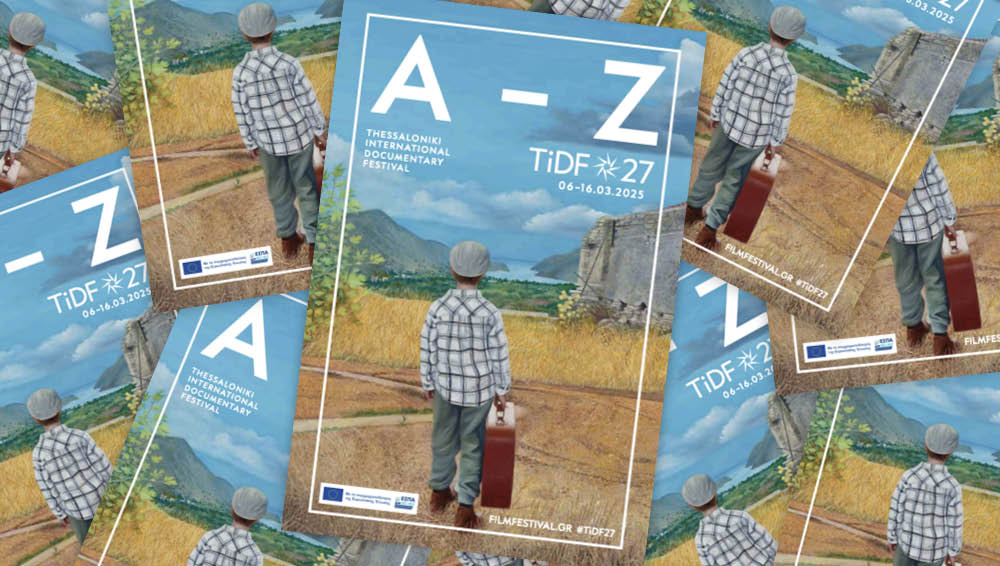November 6-15, 2015
INTERNATIONAL JURY PRESS CONFERENCE
The jury of the International Competition section of the 56th Thessaloniki International Film Festival held a press conference on Monday, 9 November 2015, at Warehouse C of the Thessaloniki port complex. TIFF director Dimitri Eipides attended the press conference.
This year’s jury president is French producer, Michele Ray-Gavras, who is joined by Corneliu Porumboiu (director, screenwriter), Jay Weissberg (film critic, journalist), Elise Jalladeau (producer) and Efthimis Filippou (screenwriter, writer). The press conference was moderated by Yorgos Krassakopoulos.
In his opening remarks, Mr. Eipides said: “It gives me great pleasure to welcome the jury of the 56th TIFF. I am very happy we have with us prominent representatives of the film industry. All of them are real supporters of the independent cinema on an international level. I wish them to enjoy the process, in an excellent cooperation, as the festival is a celebration for all of us. I also wish them best of success in their difficult task”.
Addressing a question about how they see their role as members of a jury, Corneliu Porumboiu took the floor first, saying: “I expect to see good films, which may be an inspiration for me in my future work. Also, I expect to discuss with my colleagues about cinema, which is very pleasant, as well as for us to decide together on this year’s best film. It should not be much complicated”.
On the same topic, the president of the jury Michele Ray-Gavras added that “sometimes it is a complicated process to select the best film, but surely this is easier when you have a five-member jury rather than a seven-member one”. In turn, Elise Jalladeau emphasized the importance of awards for a filmmaker stressing: “As a member of the jury, I am sensible to what credit means. Winning an award is something very important for a film and can affect its subsequent course and often the career of the director”.
Taking the floor, Jay Weissberg said it is a great pleasure to participate in the jury of the 56th TIFF, and also commented: “The Thessaloniki Film Festival is highly regarded within the international festival landscape. Winning a prize here is indeed important for the film’s subsequent course”.
The Thessaloniki International Film Festival hosts the first or second films by filmmakers from all over the world. Asked about whether one can detect a talented director based on his first film, Michele Ray-Gavras remarked that “without doubt the members of the jury have that in mind, although it is often more difficult in the second film of a director rather than his first one”. Regarding the way in which the jury members see the competing films and whether, in particular, they have a strategy in approaching the films, Ms. Ray-Gavras explained: “On watching the films, we are commenting as an average viewer would. We discuss our views, as if we were not members of a jury”.
A more complex and open-ended issue is what exactly makes a film worthy of winning a prize. Addressing a relevant question, Ms. Ray-Gavras said: “This is a difficult question. I was a member of the jury at the Cannes Film Festival twenty years ago. We had to choose between a film by Kusturica (Underground) and Angelopoulos (Ulysses' Gaze). Up until Saturday their films were very close. The same evening we sat down and watched the films and the morning after we were all in agreement about what to vote. But it is very difficult to describe from the beginning the qualitative features that will make you bestow an award to a film”.
On the same topic, Elise Jalladeau added: “When you see a director’s first film, the expectations are not the same as for example when it is a Kusturica’s film. Personally I don’t expect the first films of young directors to be perfect, but I expect to see drive and freshness. You simply don’t work the same way when you are sixty years old and when you make your first film. However, I think that often the first or second film of a director is his best one”. In turn, Jay Weissberg noted: “I am surprised by directors who do not allow you to understand that this is their debut film; those who they are not dedicated to putting in a film what they have learned so far. The freshness of a debut film is very attractive. The question is how to curb the director’s enthusiasm in this first attempt, while simultaneously using it in the film”.
Asked about how he approaches the festival’s films, participating in this year’s edition as a member of the jury, rather than a scriptwriter involved in filmmaking, Efthimis Filippou explained: “I try to be an ordinary viewer. At least this is what I try to do; if I succeed, I do not know. I just try to watch a film and say if I liked it or not. The directors and scriptwriters are ordinary people who watch films that they come to like or not”. Ms. Ray-Gavras highlighted an additional difficulty noting: “As a member of a jury, in festivals one does not just see films, but also engages in a comparative process. That is comparing each film with the other films in order to choose the winner.”
Corneliu Porumboiu remarked, in turn: “I would like to see something fresh. As a director, watching a film is like a journey and I expect to be inspired. For me, it is important that in festivals like this one we can see the work of new directors”.
Finally, addressing a question as to whether the current situation of the crisis in Greece and the rest of Europe is reflected in film production, Ms. Ray-Gavras said: “It would take hours to answer this question. During a crisis, a state should not make cuts in the cultural sector but rather increase funding. This is because culture and cinema can help in all aspects. Therefore, no cuts”.















